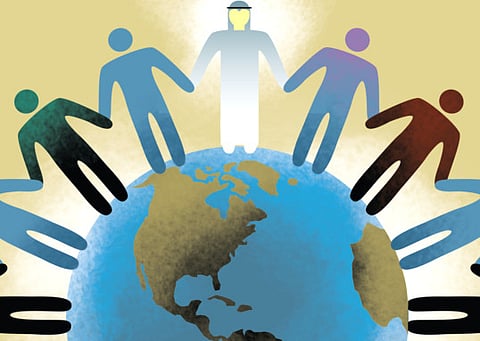UAE fights for civilisation
Universal human values of tolerance and stability are at the heart of Arab, Muslim and Gulf values

The UAE has been at the forefront of articulating the global values of tolerance and stability, and has been successful in explaining to the world at large how a Muslim, Gulf and Arab state, by definition, will support these universal human values.
Arguing against the narrow and prejudiced views of the extremists that are doing such dreadful harm to the Arab world and humanity around the globe, His Highness Shaikh Mohammad Bin Rashid Al Maktoum, Vice-President and Prime Minister of the UAE and Ruler of Dubai, spoke on the eve of the Arab Strategy Forum about the crucial importance of the ongoing battle to save civilisation.
“We are witnessing revolutions and conflicts that have one thing in common: They are against civilisation. What is happening today is a struggle between civilisation and its enemies. To defeat evil and destructive forces, we need to stop associating them with any civilisation, religion, or race as they practice killing for killing’s sake. No religious teaching or civilisation supports these practices,” he said.
This placed the current struggle against Daesh (the self-proclaimed Islamic State of Iraq and the Levant) and all other similar extremists at the highest level of human endeavour. It gives a rallying call to both Muslim and other nations involved in the fight for humanity. And this call deserves to be widely circulated as it is essential that the world at large understands that the Arab world stands firmly against such horrors.
The fight is global, as proven by terrible incidents all over the world, including the attack on New York and the Pentagon in 2001, the bombings in Bali in 2002 and afterwards, the massacres in northern Nigeria by Boko Haram, the train bombings in Madrid in 2004 and in London in 2005, to name only a few of the barbarities.
The Arab world has attracted more than its fair share of this horror, as many of its national structures have collapsed, creating vacuums in which the terrorists have been happy to set up mini-states that allow them to recruit and train people as they wish, without interference from any law-enforcement agency or military that normal nation states use to enforce the rule of law.
Somalia disintegrated decades ago, as did Iraq after 2001 and the terrible failure of the American occupation. They were followed by states like Syria and Libya (and even Egypt briefly) that were unable to withstand the shock of the reforms sought in 2011 with what was then called the Arab Spring, and quickly disintegrated into chaos and civil war, from which the militant radicals have taken huge advantage,
Fight back
The counter-attack is on many fronts. This includes the obvious military struggle, which is an essential first step to regain control and re-establish the rule of law and inclusive government structures. The UAE has been an active part of the coalitions in Iraq and Syria, fighting Daesh (the self-proclaimed Islamic State of Iraq and the Levant), and in Yemen, fighting Al Houthi rebels backed by Iran, and it stands ready to join the new coalition of Islamic countries announced earlier this week in Saudi Arabia. But it also includes standing up for the values that make the fight worthwhile and this is where the UAE has stood out among its Arab friends — by being the most forthright in explaining its principles in terms that the whole world can understand and appreciate. This clarity has won the UAE many friends, in particular in Washington, which remains the capital of the world’s sole superpower and an essential ally in any long-term struggle. The principles that the UAE has spelt out make it easier for the American administration to overcome its war fatigue and cynicism about losing American lives, with the United States acting as the world’s unappreciated policeman.
But the UAE’s position is all the more effective because it is genuine. Shaikh Mohammad meant what he said, when he spoke in September 2014, of the importance of “enlightened thinking, open minds and an attitude of tolerance and acceptance”, backed by “governments’ efforts to create stable institutions that can deliver real services to their people”. And he linked this to the urgent need to “address the black holes in human development that afflict many areas in the Middle East”, and the need to “eliminate poverty, improve education and health and build infrastructure and create economic opportunities”.
This vision of government dedicated to the service of its people and the people of the region is very far from the predatory dictatorships that have plagued the region and many parts of the world for decades. The leadership of the UAE is brave to seek to articulate its values in such a coherent form, but it has little choice since it seeks to lead in the struggle against the barbarians. It is a major challenge to set out an entire national philosophy in a few sound bites, but it is absolutely necessary. Otherwise, the agenda will be lost and the battle for civilisation will become all the more difficult.


